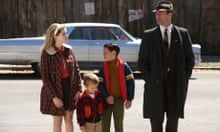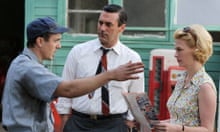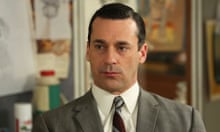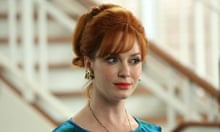SPOILER ALERT: This blog is for those who are watching season six of Mad Men. Don't read on if you haven't seen episode seven.
Catch up with Paul MacInnes's episode seven blog here.
'I've had loss in my life. You have to let yourself feel it, you can't dampen it down with drugs or sex.' – Peggy Olsen
It's one of the great things about Mad Men that, not only are there episodes in which the characters are on drugs, when watching them, the viewer feels as if they're on drugs too. Last season gives us Roger's acid awakening in which the doors of perception were held open, chivalrously, so that the audience could see harlequin hairdos and hear symphonic bottles of vodka. This week we were invited into the middle of an amphetamine binge, only to find that – for both cast and viewer – time ran out of control, blackouts were suffered and moments of mild hallucinatory discombobulation were felt. All in all, a grand episode!
The speed freakout was occasioned by the demands of Chevrolet. This new account may have dragged SCDPCGC (a mouthful indeed) into the big leagues, but it has also created greater expectations. We see Don and Ted shattered in the office, their creative juices spent. But they can't stop working, because Ken, forced to undergo ordeals of terror at the wheel of an Impala, needs even more material to take to the client. They decide on another weekend in the office, and with Ted safely out of the way at Frank Gleason's funeral, naughty Jim Cutler is able to bring in his favourite physician, Dr Hecht, first name – no doubt – Robert.
One by one the staffers line up for a shot of energy serum, a proprietary mixture of vitamins and a mild stimulant that will provide 24 to 72 hours of uninterrupted creative focus. Or, to you and me, a big old dose of uppers. When Don emerges after his shot, Cutler and Stan are having running races. Within minutes, Don himself is flipping into flashbacks of the whorehouse in which he remembers a moment of female tenderness and the eventual loss of his virginity. He also starts dashing around, a mist of sweaty pomposity in his wake, declaring "there is an answer, there is a way around this system", or what was already known by viewers but never said on screen: that "the timbre of my voice is as important as the content". Oh yeah, and he blacks out for hours on end.
Don's lapses are interpreted cleverly by writers Jason Grote and (yes) Matthew Weiner, as well as director Michael Uppendahl, to give the viewers a bit of a shock too. When Don stumbles into the writers' room he encounters a situation reminiscent of a dream – Peggy and Jim, dressed in black, are standing calmly around a young stranger who is interpreting the I Ching. She is introduced as Wendy by a prone, shut-eyed Harry. The calmness of this scene, contrasted with Don's feverishness, makes it unsettling and confusing. Have we missed something? When, at the end of the episode, Wendy is revealed to be the daughter of the deceased Frank, we realise we very much have.
******
So what is it Don is looking for? One is tempted to say nothing in particular, or at least something that can't be found. Casaubon's Key to All Mythologies perhaps. Don certainly thought he was on to something: "I've got this great message and it's to do with what holds people together." And what did that message mean? It may have been the ultimate, the ur-sell that could be replicated across all adverts ever. It could also have been the chatup line Don was planning to use to get Sylvia back. Most likely of all, though, is that it was just a rush of sentimentality that didn't cohere into anything.
Don's revelation came from his flashback which, in turn, reminded him of an old soup campaign. He remembered that, when feverish as a youth, he had been cared for by a hooker with a heart, Aimee Swanson. Not only that, but she took his cherry. (For no given reason, it has to be said, beyond the usual "do you like girls?" male wish-fulfilment guff; but taken all the same.) Aimee knew what young Dick really wanted and was prepared to do what was necessary to give it to him. Flash-forward 20 years or so and "Because you know what he needs" has become the tagline for a tinned comestible.
This little narrative provided one of those moments when I wasn't sure what to think. On the one hand, these experiences and subsequent intuitions mark Don out as, once again, a man out of time, a chauvinist whose beliefs about women are being superceded. On the other hand, though, it's here that we see Don at his most human, his most caring. He remembers his time with her fondly and with gratitude, he tries to transpose these feelings on to others: Ted's secretary and Peggy among them. It alsoappears he genuinely is in love (or perhaps just wants what he can't have, I am not ruling that out) with Sylvia. I'm torn.
******
The illusory elements of this week's episode bled into every storyline, including the one set outside the SCDPCGC offices. Sally's encounter with unlikely catburglar Grandma Ida was as weird as anything going on in Don's head. Having been left home alone by both Don and Megan, Sally is disturbed by unusual sounds in the night. That is the traditional signifier for "burglar". But when she steps out to investigate, she finds a portly middle-aged black woman standing in the kitchen apparently wanting to cook her some eggs.
A disquieting conversation follows as Sally attempts to prove that this woman is a stranger, while Ida tries to spin a tale of southern down-homeliness, claiming to be Don's adoptive mother. That the flashbacks have shown young Dick rejected by his step-mother (she wants him and his illness out of the brothel) makes us think that, yes, being raised by someone else might then have been possible. That Ida seems desperate to find his watch, might remind us of PFC Dinkins. Maybe there are more timepieces of sentimental value. She even knows Don's name.
As it turns out, though, these allusions are just illusions and Sally's instincts were right. As Megan observes later (a little too coolly for my liking, you could have got those children killed!): "Sally seemed so grownup but she's really still a kid." Yet her childish actions are matched by an adult self-awareness of her mistakes. The telephone conversation between Don and Sally the next day is touching as Don strikes both a conciliatory and soothing tone, while Sally stands straight on her own two feet, listening and comprehending everything her father says. Maybe she won't go off the rails after all.
This week's notes
Puking at a funeral, fainting in his own home, sweating all the time: however turbulent his mental state, Don's physical health is going downhill too. Get that man a spa weekend. Or just a different way of life.
Betty's gone blonde again. And lost even more weight. Must be that politician's wife diet.
Despite all the fancy footwork, Ken Cosgrove is not happy in his job. This is a guy with an artist's heart – perhaps constantly consorting with frattish car execs is not quite what he's suited to.
Time stamps
Stan's revelation/exploitation of his cousin's death was an acute reminder that the Vietnam war was hitting ever closer to home – 1968 brought the highest death toll for US servicemen of the entire war. At 16,899, it was more than 5,000 higher than the previous year (and the following year too).
Culture club
At last we get to see a proper hippy and, naturally, she has brought an eastern affectation with her. The I Ching is a venerable form of sooth-speculating, bringing the yin and the yang together to create some crazy hexagrams (in truth the whole thing is so complicated that that, my friends, is the best I can do). Used in China for almost five millennia, it finally made it to the west at about the same time as George Harrison discovered the sitar.











Comments (…)
Sign in or create your Guardian account to join the discussion